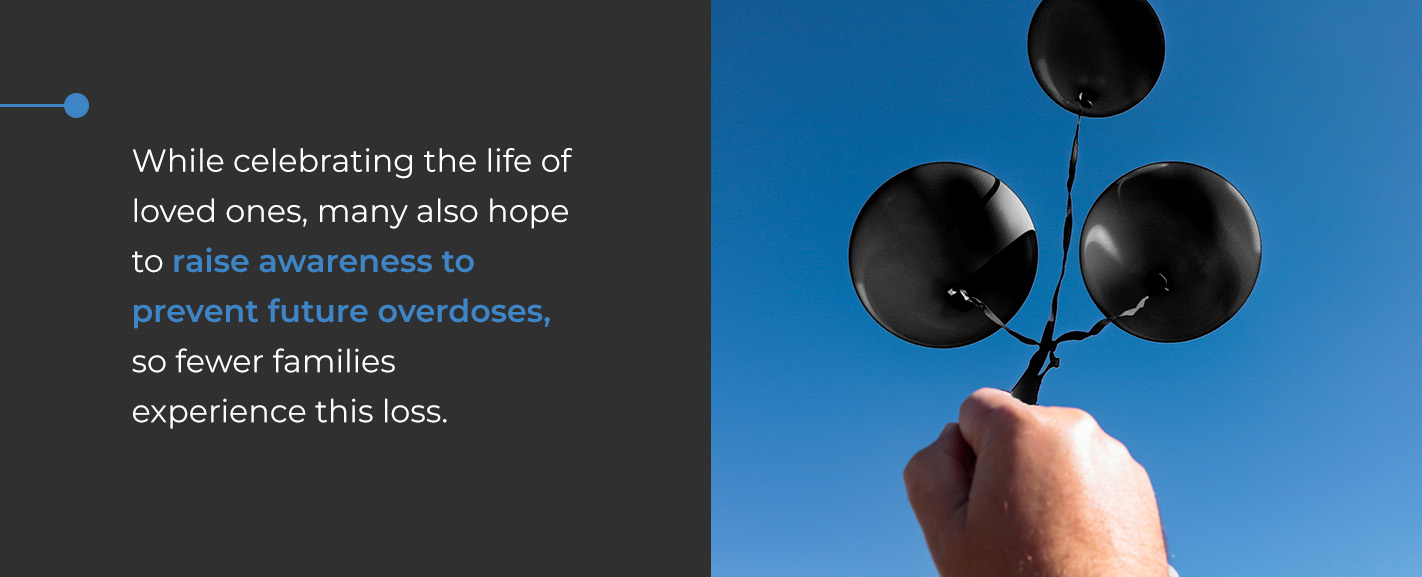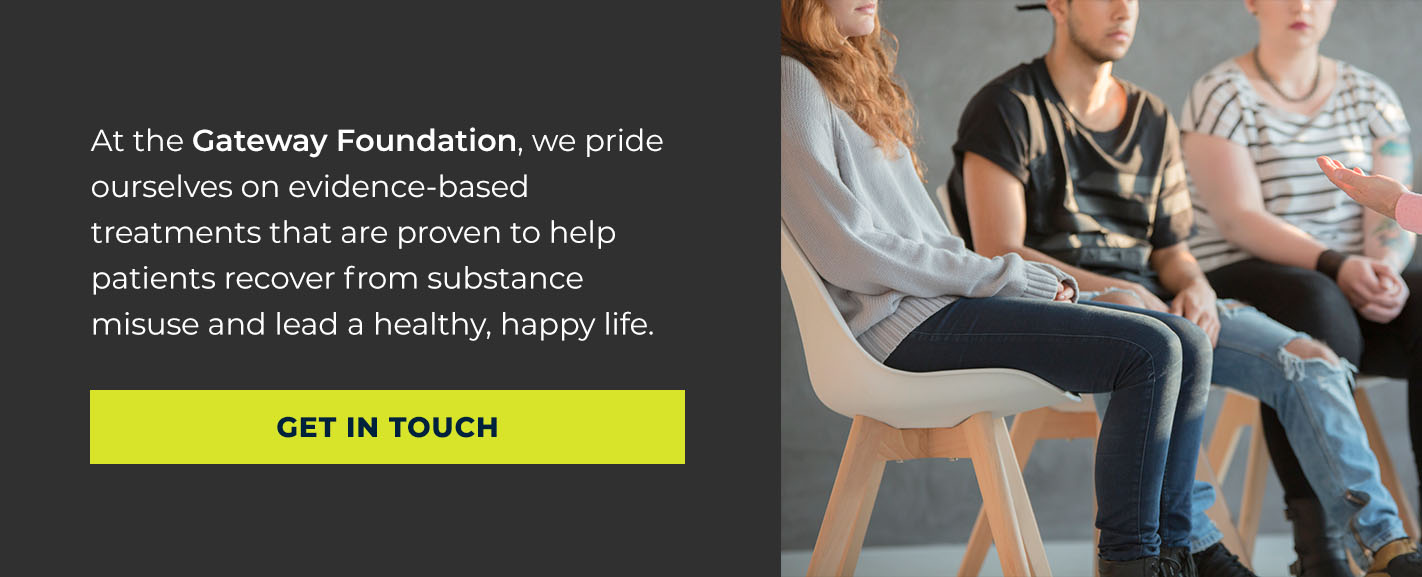- Feb 2
- AddictionAlcohol Addiction Treatment
Drug misuse and substance dependencies have become a large-scale problem affecting many people throughout the United States and the world. Unfortunately, opioids are one of the most widely misused substances fueling dependencies and leading to increasing overdose rates. Black Balloon Day is a day for friends and family members to come together and celebrate the memories of loved ones lost to substance misuse.
- When Is Black Balloon Day?
- Black Balloon Day Meaning
- History of Black Balloon Day
- Raising Awareness on Black Balloon Day
- Support & Resources for Those Who Are Addicted
- Evidence-Based Substance Dependency Treatment
When Is Black Balloon Day?
Black Balloon Day is every March 6 and allows families, friends and loved ones to celebrate the lives and memories of those lost to overdose. Black balloons serve as a symbol for the day to represent and celebrate the lives of those lost. Since 2015, Black Balloon Day has become a national and international event to raise awareness for addiction sufferers.
Overdose is the leading cause of accidental death in the United States, with opioids being the most common substance to lead to an overdose. While any substance misuse contributes to the epidemic, opioid drugs are responsible for most overdoses and substance dependencies. Black Balloon Day helps raise awareness about substance misuse and the rise in overdose deaths.
Black Balloon Day Meaning
Black Balloon Day is designed to raise awareness about drug dependencies, especially the dangers of opioids, which often result in accidental overdoses. Black Balloon Day can be a healing day for families and friends to come together to remember an important person they lost. An important aspect of Black Balloon Day is to raise awareness about the dangers of opioids to lower the number of those addicted and those at risk of an overdose.
Approximately 10% of adults in the United States experience a drug use disorder at some point in their lives, with almost 75% of those not receiving any treatment. While Black Balloon Day raises awareness to prevent drug use disorders, it also helps those working through addiction find the treatment they need to heal and recover.
History of Black Balloon Day
The family of Greg Tremblay created Black Balloon Day in remembrance of his passing from an overdose on March 6, 2015. Diane, Greg’s mother-in-law, and Lauren Hurley, Greg’s sister-in-law, started Black Balloon Day to honor and memorialize Greg, a 38-year-old father of four. After his death, Black Balloon Day helped his family and friends to remember the impact he had on them and raise awareness of the opioid crisis.
While Black Balloon Day began as a small tribute to Greg Tremblay, it grew in popularity and became an event celebrated worldwide. Whether you release physical or virtual balloons, Black Balloon Day is a way for people worldwide to come together and celebrate the memories of loved ones they lost to substance abuse. While celebrating the life of loved ones, many also hope to raise awareness to prevent future overdoses, so fewer families experience this loss.
Raising Awareness on Black Balloon Day
While Black Balloon Day serves as a wonderful way to come together with friends and families to remember loved ones, it also performs an essential purpose to further the conversation on drug dependencies and potential treatments. As more people celebrate Black Balloon Day, it helps further the conversation and invites people to learn and ask questions.
Unfortunately, overdose rates continue to increase, but days like Black Balloon Day continue to bring awareness to this epidemic and help educate people about the dangers of substance misuse. Raising awareness of the opioid epidemic and overdose rates can help those dealing with a substance dependency find guidance and the treatment they need to recover. Family members and friends can also learn more about substance misuse on Black Balloon Day and help loved ones find the treatment they need.
Black Balloon Day aims to remove the harsh stigma around substance dependency or opioid misuse. Many people avoid receiving treatment because they do not think they can afford it or are worried about the stigma and judgment placed on them if they come forward with a substance use disorder. Reducing the stigma associated with substance misuse can help many people seek out professional treatment and begin recovering.
Support & Resources for Those Who Are Addicted
Despite substance misuse being a widespread issue, fortunately, many resources are available for patients looking to overcome a substance dependency. Learning about the support and resources available may encourage those with a dependence to seek treatment. Friends and family members can also learn about the various resources to help a loved one seek proper treatment.
Below are some options for helping you or a loved one get the assistance you need.
Withdrawal Management
For those actively dealing with a substance use disorder, one of the first steps of the treatment is to manage withdrawal symptoms safely. As your body detoxes from a dependent substance, you may experience mental and physical symptoms. These symptoms vary from person to person and depend on the substance you are detoxing from and how often you use the substance.
Some of the most common mental health symptoms of withdrawal include depression, anxiety and hallucinations. Physical symptoms include sweating, shaking, vomiting and, in severe cases, seizures. Withdrawal management is necessary to minimize the effects of these symptoms and prevent additional side effects and complications.
Withdrawal remains a challenging first step in the recovery process. Medical professionals and withdrawal experts can help you through this challenging process. Withdrawing without the guidance of a professional can be extremely dangerous and even life-threatening. Withdrawal management enables you to get through the detoxification process so you can begin your recovery journey.
Drug Addiction Treatment
While withdrawal management is an essential step in recovery, drug abuse treatment focuses on symptoms and experiences extending beyond the initial detoxification symptoms. During substance misuse treatment, you receive the medical support you need. Managing the physical complications of drug dependency is a crucial aspect of helping a person heal. Medication-assisted treatments help minimize medical complications of recovering from a substance dependency.
Mental Health Services
In addition to the physical symptoms of a substance dependency, mental health services are an essential aspect of recovery. Mental health issues and substance abuse often go together, with many people misusing substances as a form of self-medication to treat underlying mental health issues.
People may develop mental health issues while using drugs, too. Researchers found that some drugs can cause changes in the brain, leading to potential mental health issues, including anxiety, depression, obsessive-compulsive disorder (OCD) and more. In many cases, a substance dependency and mental health condition coexist and need equal attention for treatment.
Treating these underlying mental health conditions helps you understand certain behaviors or actions that led you to misuse a substance in the first place.
Evidence-Based Substance Dependency Treatment
At the Gateway Foundation, we pride ourselves on evidence-based treatments that are proven to help patients recover from substance misuse and lead a healthy, happy life. Our team offers innovative therapies for both the physical and mental symptoms of a substance dependency. While our approach to care is evidence-based, we also customize these treatments to fit all patient needs. To get started with our drug and alcohol rehab services, contact us online today or call 877-381-6538.




